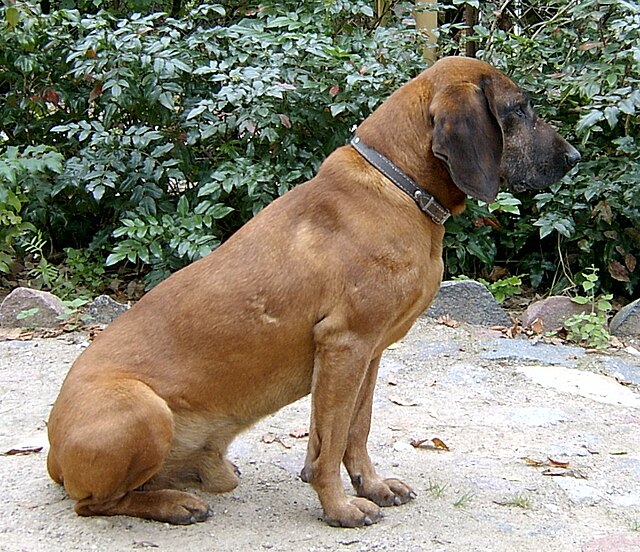


The Bavarian Mountain Hound is a versatile and skilled tracking dog, primarily known for its ability to work in the mountainous terrain of Bavaria, Germany. Originally bred as a scent hound, this breed excels in tracking down wounded game and is highly prized by hunters. The Bavarian Mountain Hound is known for its excellent nose, endurance, and tenacity. Although primarily a working dog, it can also make an affectionate and loyal companion when properly socialized. With its reserved nature, the Bavarian Mountain Hound tends to bond closely with its family, often forming a strong connection with its human companions.
The Bavarian Mountain Hound has a long history as a scent hound, developed in the rugged landscapes of Bavaria in southern Germany. It was initially bred in the 19th century for tracking and hunting, particularly for hunting wild boar and other large game. The breed’s roots can be traced to a combination of ancient German hunting dogs and various European scent hounds. The Bavarian Mountain Hound was specifically bred to have a keen sense of smell, combined with agility and stamina to work in the challenging mountainous terrain. The breed's skills in tracking were highly valued by hunters, and over time, it gained a reputation for being one of the most reliable tracking dogs. Today, the breed is still used for hunting purposes, though it is also valued as a companion dog in some regions.
The Bavarian Mountain Hound is a medium-sized dog, with a compact and muscular build that reflects its strength and stamina. On average, this breed stands between 16 to 19 inches tall at the shoulder and weighs between 40 to 55 pounds. The coat of the Bavarian Mountain Hound is short, dense, and weather-resistant, helping it to withstand the cold and wet conditions of its native mountainous habitat. Coat colors vary, typically in shades of red, brown, or tan, and the breed often has a characteristic black or darker marking on the back and head. The Bavarian Mountain Hound’s facial expression is intelligent and alert, with dark, expressive eyes that are deep-set and convey a sense of determination. Its long, floppy ears and strong nose are also distinguishing features. The tail is moderately long, often carried in a slight curve, and used to signal the dog’s focus during tracking.
The Bavarian Mountain Hound is known for its reserved and independent nature, particularly with strangers. While it may initially appear aloof, this breed is typically very affectionate and loyal to its family members. It has a calm and dignified demeanor, but it is also energetic and persistent when working. Bavarian Mountain Hounds are intelligent and alert dogs, with a strong instinct to track and follow scents. They can be very vocal, particularly when on the trail, and are known for their ability to communicate with their handlers through distinct barks and signals. Although reserved around strangers, they are usually good with children and can get along well with other pets when properly socialized. Early socialization is key to helping them develop into well-adjusted companions.
The Bavarian Mountain Hound is an active breed that requires regular exercise to keep its body and mind engaged. Originally bred for tracking and hunting, it has high energy levels and thrives in environments that allow it to explore and use its keen sense of smell. Daily walks, runs, or hikes in an open area are ideal for meeting the exercise needs of the Bavarian Mountain Hound. If you are an active person who enjoys outdoor activities like hiking or running, this breed will make an excellent companion. They also benefit from mentally stimulating activities, such as scent games or obedience training, which tap into their natural instincts. Given their strong work ethic, Bavarian Mountain Hounds are not suited to being left alone in a yard without sufficient activity or mental stimulation. Without adequate exercise, they may become bored and display undesirable behaviors.
The Bavarian Mountain Hound is an intelligent breed but can be somewhat independent and stubborn, especially when it comes to training. They are highly motivated by scent, and their tracking instinct often takes precedence over other training methods. Positive reinforcement, such as food rewards and praise, works best to encourage cooperation and build a strong bond between dog and handler. Early training and socialization are critical to help the Bavarian Mountain Hound grow into a well-behaved and well-adjusted dog. These dogs may be reserved around strangers and new experiences, so exposure to different environments, people, and other animals will help them become more confident. With consistent training, Bavarian Mountain Hounds can excel in activities like obedience, agility, and scent work.
The Bavarian Mountain Hound is generally a healthy breed, but like all dogs, it can be prone to certain health conditions. Common health concerns for the breed include hip dysplasia, ear infections (due to their floppy ears), and some issues related to their strong hunting drive, such as overexertion or dehydration when working in hot conditions. Regular veterinary check-ups are important to monitor for these potential health issues, and keeping the dog at a healthy weight is essential to prevent stress on its joints. Regular grooming is minimal due to their short coat, but they should be brushed periodically to remove loose hair and prevent mats. Their ears should also be checked and cleaned regularly to prevent infections. A balanced diet and ample exercise are key to maintaining their overall health and fitness.
The Bavarian Mountain Hound has an average lifespan of 12 to 14 years. With proper care, including regular exercise, a healthy diet, and routine veterinary visits, many Bavarian Mountain Hounds live long, healthy lives. Like all breeds, their lifespan can be influenced by genetics, environment, and the quality of care they receive. Regular check-ups can help detect and treat any health issues early, improving their chances for a longer, happier life.
© copyright Dog Compendium 2024 - 2026